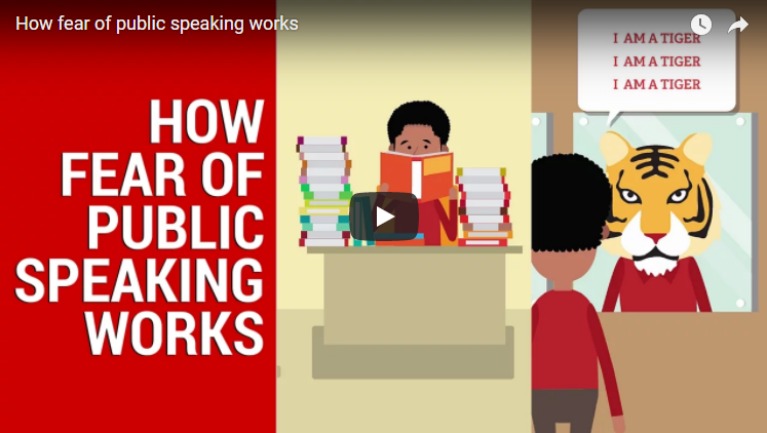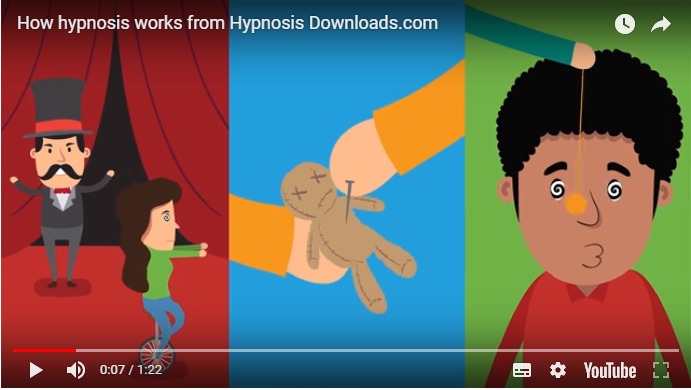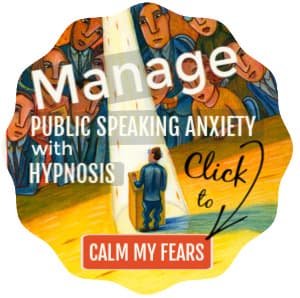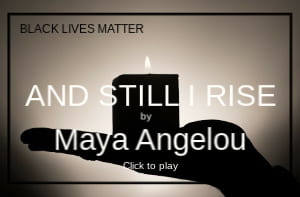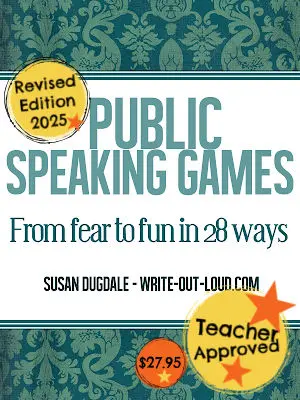- HOME ›
- Public speaking fear ›
- Managing public speaking anxiety
Manage public speaking anxiety
By: Susan Dugdale
Are you here because you have a speech to make, or a presentation coming up, and you're feeling anxious?
And is this feeling familiar? Every time you have to speak in public, do you become fearful?
Public speaking and fear become a vicious circle
Unfortunately, your experience is fairly common.
Also unfortunately, the harder many people try to manage their anxiety about public speaking the worse it gets.
Public speaking and feeling anxious have linked themselves together to become a vicious cause and effect circle.
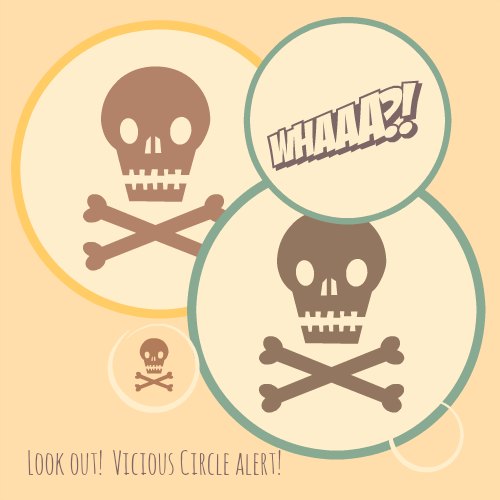
Live streaming from vicious circle central
If we could get inside ourselves and live stream what's going on we'd see and hear something like this:
I have a presentation to make! It's coming up soon. (This is the cause or the trigger. And this, below, is our response.)
Even though it's several days or more away, my heart is already beating faster, and my breath is becoming shallower and more rapid if I think about it.
In addition, my imagination goes into overdrive, flooding my mind with negative thoughts.
I see myself standing in front of the audience making a complete fool of myself.
My voice squeaks. I can barely get my words out.
My knees knock.
My mind goes blank.
I blush. I hear myself babble and blurt.
I go hot. Then I go cold and feel faint.
Finally, I see myself stumble away from them. As I go, I am swearing to myself that I will never, ever, try to speak in public again.
Inevitably, the result of thinking like this is shame. It makes a person feel small, silly and helpless.
Other people talk easily and confidently in public. Why not me?
The cumulative impact of repeated fear-filled experiences
The sense of failure and feeling like an idiot after being swamped by public speaking anxiety adds to the pressure we feel and to the viciousness of the circle.
The next time having to give a presentation comes around the fear is even stronger. Sadly, it builds up and compounds.
This is because our past negative experiences of speaking in public have been effectively lock-stepped* with the symptoms of fear and dread. In our minds, they belong together - an association that is intensified and reinforced each time we are called on to speak in front of others.
*Lock-stepped - something habitually paired with something else

Shifting the fear/breaking the cycle
Have you tried many things to break the cycle and so far nothing has really helped?
Would you consider changing your approach?
Up until now you've likely been using your willpower - literally trying to force yourself to override the fear. However, as you've discovered, that by itself is not enough.
The shakes will not vanish because you think they should. What you think, or don't think, is not the trigger flicking them into action.
The video below shows us what does set the cycle in motion very clearly.
Watch how fear of public speaking works
Using hypnosis to manage public speaking anxiety
In the video, near the end of the explanation about 'Why people suffer from public speaking fear' you will have found an invitation to find out more about a course called 10 Steps to Powerful Public Speaking.
The course uses hypnosis.
For some people, maybe you too, the word 'hypnosis' is a red flag alert.
As soon as they hear or read it, they remember some sort of story about what happened to a man who went to a show. He got hypnotized, and ran around the stage barking maniacally at the audience.
Or the woman who, when told she was Elvis, broke into a hip-swiveling rendition of Heart Break Hotel.
This course is not that. That is stage hypnosis. Its purpose is to entertain, to amuse.
Getting clear on hypnosis for healing
This is hypnotherapy - therapy that is based on, and uses, hypnotic techniques. Its sole purpose is to heal, to enable the person using it, you, to live more fully and confidently.
Click this link Is what you've heard about hypnosis true or false? to watch the video 'How hypnosis really works' and to get clear on common myths and misconceptions about hypnosis.
And then if you want to know more about the people and the company behind 10 Steps to Powerful Public Speaking, please click this link About Hypnosis Downloads and Uncommon Knowledge.
You'll see they are a highly professional reputable company with numerous reviews endorsing their services.
10 steps to powerful public speaking
Are you ready to imagine yourself as a confident capable speaker?
Yes?
And are you ready to begin making that your reality?
This multi-media self-paced course, prepared by Mark Tyrell, one of the co-founders of Hypnosis Downloads, covers ten aspects that combine to make a person feel good about public speaking.
Each step is fully documented in the course manual (work book) and supported by a carefully crafted audio download. The recommended dosage is one audio session per day.
This is anywhere, anytime learning. You can download to your computer, tablet, or phone and listen to your session whenever and where ever is best for you.
It's discreet. (You don't have to explain to anyone about where you are going and why.) It's affordable, and comes with a no questions asked, money back guarantee.
Manage your public speaking anxiety & gain

When you break free of the public speaking fear that's been holding you back you gain in so many ways.
Here's a few of them -
- you feel comfortable in front of an audience
- an up coming presentation does not dominate your emotional and mental life - night AND day
- you enjoy sharing your ideas
- you no longer feel self-conscious
- the need to be absolutely perfect has vanished
- you are able to be flexible, funny and spontaneous when you speak
If you're ready to move on click the button
PS. Hypnosis Downloads have 100s of courses
Use the search box to find help with parenting skills, depression, job skills, weight loss, self esteem, stopping smoking ...
Affiliate disclaimer
When you purchase a course from Hypnosis Downloads part of what you pay come to me. Thank you!
